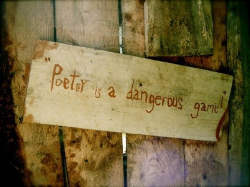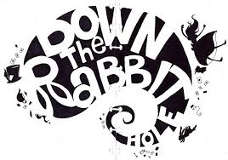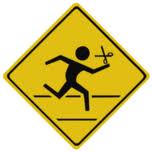Risks in Reading for the Art of Biblical Narrative
 Graham has recently written a couple of posts (here and here) on Alter's seminal work, "The Art of Biblical Narrative". The "New Literary Criticism" movement is not new any more although it certainly retains its exciting lustre for Bible students. This is true because the literary movement (the "new" one anyway, as opposed to the old "redaction critical" type of "literary movement", in case any nerds were wondering) has a number of great strengths over its predecessors.
Graham has recently written a couple of posts (here and here) on Alter's seminal work, "The Art of Biblical Narrative". The "New Literary Criticism" movement is not new any more although it certainly retains its exciting lustre for Bible students. This is true because the literary movement (the "new" one anyway, as opposed to the old "redaction critical" type of "literary movement", in case any nerds were wondering) has a number of great strengths over its predecessors.
First, I love the fact that we are encouraged to view texts as a whole, assuming the author/editors were not idiots and were constructing something coherent. I love the fact that discernible shifts that would previously have caused scholarship to break texts apart now inspire attention to why they would have been brought together and how they build on one another.
Second, because the shift (especially in Old Testament studies) has been from a "looking through the text at the period in which it was written" kind of approach to an analysis of the text itself, I appreciate the new focus. Now the text is at the forefront. This is great news for people who think the Bible is living and active and suitable for training in all righteousness. It great news for people who think Scripture is God's Word and has something to say to us today.
Third, studying the Bible does not have to be an obscure scholarly discipline dependent on thorough knowledge of original languages, etymology and some strongly held opinions on historical reconstructions that are mostly best guesses. It is something anyone can do because much of what should be gleaned from a narrative can be gleaned in a secondary language. It's like the reformation or the translation of the Bible into English that saw the lay person empowered to interpret Scripture for him/herself. Of course it comes with its own set of problems but they're a better set of problems than the alternative. One thing to note is that this is less and less the case as literary techniques are carried over and the field once again becomes filled with jargon and defined methodologies not apparent to the lay person. Nevertheless, pointing someone to the text and saying, "read it and try to make sense of why it was written" is not a bad start and it's encouraged by the literary movement.
There are, however, two dangers associated with literary techniques. If you've read this far, you should check out Longman's article, "The Literary Approach to the Study of the Old Testament: Promise and Pitfalls" which I have found valuable to my own thinking and has been formative in my thinking on the subject. The critiques I'm raising are not ground breaking nor are they necessarily the most significant. They are simply the concerns that are at the forefront of my mind and are simply raised to contribute to the discussion Graham has started.
1. Loss of Grounding in History
 I think the most disturbing trend in literary readings is the willingness to abandon external objectivity. If all that matters is the text and its effect on me today, then reference to anything historical loses significance. One of the most disturbing features of The Art of Biblical Narrative is Alter's dismissal of David's historicity. As far as Alter is concerned, there was perhaps a king named David but all that stuff about giant slaying (and most of the rest of his life actually) is myth built up around him so that Israel have something in their history to be proud of.
I think the most disturbing trend in literary readings is the willingness to abandon external objectivity. If all that matters is the text and its effect on me today, then reference to anything historical loses significance. One of the most disturbing features of The Art of Biblical Narrative is Alter's dismissal of David's historicity. As far as Alter is concerned, there was perhaps a king named David but all that stuff about giant slaying (and most of the rest of his life actually) is myth built up around him so that Israel have something in their history to be proud of.
Alter's perceptive observation of type-scenes, while insightful, results in a further severing of text from history. Now every time we find a meeting at a well we know that we are not reading actual occurrences, it's just the "ol' hookup at the well scene" - the Hebrew idiom for engagement. To be honest, this doesn't seem like much to lose - and it's not if the well scene is just the Hebrew idiom for engagement - in fact it's a superior reading, but only if we are right that an account couched in historical setting is really idiomatic. The advantage is that we realise how often historical grounding doesn't matter much (and so we don't have to fight to the death over how many years the Judges period covers, for example) but the danger is that we similarly don't worry when it does. The question is, are we losing something if we read the stories of David as ahistorical? It's a question that I've been wrestling with for quite some time but not one I think is anywhere near being solved.
 Nevertheless, in his article, Longman (1985:394) quotes Frye, "The Bible possesses literary qualities but is not itself reducible to a work of literature." This seems an important corrective. As we venture down the literary rabbit hole - often in flight from historical-critical methodologies - we need not (perhaps, we must not?) let go of history. In their major contribution to the subject Provan, Long and Longman (2003:81) write, "The ahistorical path is a dead end. Where biblical texts make historical truth claims, ahistorical readings are perforce misreadings - which remains the case, whatever one's opinions may be regarding the truth value of those claims."
Nevertheless, in his article, Longman (1985:394) quotes Frye, "The Bible possesses literary qualities but is not itself reducible to a work of literature." This seems an important corrective. As we venture down the literary rabbit hole - often in flight from historical-critical methodologies - we need not (perhaps, we must not?) let go of history. In their major contribution to the subject Provan, Long and Longman (2003:81) write, "The ahistorical path is a dead end. Where biblical texts make historical truth claims, ahistorical readings are perforce misreadings - which remains the case, whatever one's opinions may be regarding the truth value of those claims."
If in our quest for literary readings, we gain textual unity and prominence but lose its historical roots I think the quest will, in the end, have been futile.
2. Loss of Stability in Interpretation
 Longman's (1985:391) fourth concern is "the danger of moving completely away from any concept of authorial intent and determinant of meaning of a text." In recent years the idea of textual meaning outside of its reader has been radically challenged. In "Narrative in the Hebrew Bible", Gunn and Fewell's follow up to Alter's "Art of Biblical Narrative", we find one of the more eloquent defences of reader response interpretation. We read (1993:xi), "Most significant, however, it differs from all these books in its hermeneutical assumptions. Unlike the others ... our book understands interpretation to hinge crucially upon the reader, and not just in terms of a reader's 'competence'. Meaning is not something out there in the text waiting to be discovered. Meaning is always, in the last analysis, the reader's creation, and readers, like texts, come in an infinite variety."
Longman's (1985:391) fourth concern is "the danger of moving completely away from any concept of authorial intent and determinant of meaning of a text." In recent years the idea of textual meaning outside of its reader has been radically challenged. In "Narrative in the Hebrew Bible", Gunn and Fewell's follow up to Alter's "Art of Biblical Narrative", we find one of the more eloquent defences of reader response interpretation. We read (1993:xi), "Most significant, however, it differs from all these books in its hermeneutical assumptions. Unlike the others ... our book understands interpretation to hinge crucially upon the reader, and not just in terms of a reader's 'competence'. Meaning is not something out there in the text waiting to be discovered. Meaning is always, in the last analysis, the reader's creation, and readers, like texts, come in an infinite variety."
To be fair, my experience of Gunn and Fewell has been that they are pretty responsible. The point is that when the author's stabilising influence is lost, the stabilising influence of the text is lost for the same reasons. In the end, the many and varied interpretations of the reader(s) are all that is left. This means that there is no stability to meaning. Whether or not this matters is the topic for another oversized post, I'm going to assume that it is.
An example of this was given in a recent Christianity Today article about the Bible and Technology,
Bible tech has provided personal epiphanies, such as when he [Evans] learned the Hebrew word for bread, lehem. "Lehem is bread! Bethlehem means 'House of Bread'! Jesus is the Bread of Life! Hebrew is magic!" But the same software that draws such connections also taught him to think more skeptically—even about the very connections that got him so excited, Evans said. "What we're doing here makes it very easy to run with theological scissors." The tools can be used, to use an example several people referenced, to develop an intense numerological theory about the significance of the 153 fish caught in John 21. It's kind of a throwback to the early church, when preachers loved pontificating on repeated words, images, and numbers in disparate biblical books. But database-driven interactive text seems to especially encourage this kind of reading, where one simple mouse click pulls up thousands of pages of cross-references and commentary on each word. It's an awful lot like 2001's A Beautiful Mind, where Nobel laureate John Nash is able to see real patterns no one else had seen—but also sees patterns that don't really exist.
In his small masterpiece, Exegetical Fallacies (an absolute must read), Carson speaks of "Verbal Parallelomania" in which the "bare phenomena" of verbal parallels are said to "demonstrate conceptual links or even dependency" (2nd Ed. pg43). Carson is particularly critical of these parallels when they are found in extra-biblical literature (à la Babylonian creation myths?).
It is remarkably easy to find parallels (in fact Carson speaks of "conceptual parallelomania" later in Exegetical Fallacies as yet another way of finding dubious parallels) especially with the power of Google on your side. In the era of literary readings, it is difficult to critique the abundance of parallels that can be discovered because those parallels are discovered by the reader and, for better or worse, the reader has become the hermeneutical pivot around whom meaning revolves. Maybe it's just that I'm a stodgy conservative but that is a bit of a problem for me. Carson noted that of the 300ish parallels found by Bultmann and Dodd in the prologue of John there was only a 7% overlap.
 This is not to say that parallels never exist and certainly not that they never matter. It is, however, a caution to this author. I have often found myself making the argument "the writer of this passage of Scripture has the entire corpus of biblical literature memorised, so of course when he says this similar sounding thing he has in mind that primary idea which he is extending". It is very easy, by means of methodologies introduced by the new literary criticism, to introduce radical instability into textual exegesis or to, "run with theological scissors".
This is not to say that parallels never exist and certainly not that they never matter. It is, however, a caution to this author. I have often found myself making the argument "the writer of this passage of Scripture has the entire corpus of biblical literature memorised, so of course when he says this similar sounding thing he has in mind that primary idea which he is extending". It is very easy, by means of methodologies introduced by the new literary criticism, to introduce radical instability into textual exegesis or to, "run with theological scissors".
Conclusion
The loss of history and the loss of stability in meaning are not inevitabilities in literary readings but they are both pitfalls into which literary critics have already fallen. In our era it is in vogue to be a sceptic but I am confident that as the philosophical tides change we will look like real plonkers if we are found to have succumbed to absolute relativism, having detached everything from anything. In the process of investing our time and energy into the new literary criticism which, as has been seen, promises much fruit, we must coordinate our text with history and we must not descend into a myriad of meanings that leave us in a sea of meaninglessness waiting and hoping the tide will carry us back to land.
Readings Cited
Carson, Exegetical Fallacies. 1996.
Longman, The Literary Approach to the Study of the Old Testament: Promise and Pitfalls JETS 28:4 pp. 385-398.
Provan, Long, & Longman, A Biblical History of Israel. 2003.
Yee, The author/text/reader and power: suggestions for a critical framework for biblical studies eds. M. A. Tolbert, F. F. Segovia – pg109-118.
http://www.christianitytoday.com/ct/2014/march/bible-in-original-geek.html?paging=off